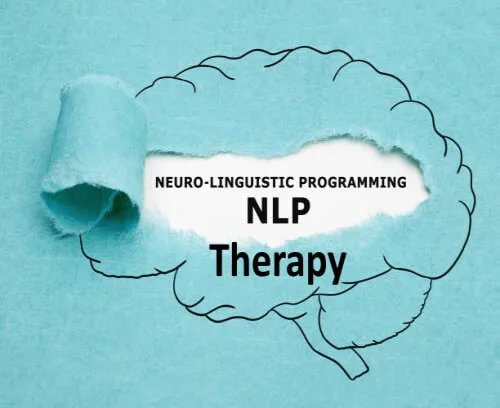Neuro Linguistic Programming (NLP) is a powerful therapeutic tool that can help people overcome a variety of issues. But how does NLP therapy work?
Table of Contents

Hi, Ian here!
So, you’ve stumbled upon the intriguing world of NLP therapy. But before you dive headfirst into its fascinating depths, let’s take a moment to unravel the mystery behind its workings.
NLP, or Neuro-Linguistic Programming, is a therapeutic approach that explores the intricate connection between our minds, our language, and our behavior.
It’s like having a personal user manual for your brain!
Imagine your mind as a complex computer system, constantly processing information and generating thoughts, feelings, and actions. NLP therapy acts as a skilled programmer, identifying and tweaking the underlying codes that shape our experiences. By understanding how our minds interpret and respond to language, NLP practitioners can help us rewire our internal dialogue, transforming negative thought patterns into empowering ones.
Think of it like replacing a faulty software program with a more efficient and productive one. NLP therapy aims to equip us with the tools to navigate life’s challenges with greater resilience, confidence, and a sense of control.
Now, let’s delve into the nitty-gritty of how NLP therapy works. It’s not about waving a magic wand or chanting mystical incantations. Instead, NLP employs a range of techniques, each designed to influence our perceptions and behaviors.
One of the keystones of NLP is reframing. This involves shifting our perspective on situations, events, and even ourselves. By changing the way we view things, we can transform our emotional responses and open up new possibilities.
Another powerful tool in the NLP arsenal is anchoring. This technique involves associating positive emotions with specific triggers, such as a particular word, gesture, or even a memory. By anchoring positive feelings, we can instantly boost our mood and motivation, even in the face of adversity.
NLP also emphasizes the power of language. The words we choose, both spoken and internal, have a profound impact on our thoughts and actions. NLP therapy teaches us to use language consciously, crafting empowering affirmations and replacing self-limiting beliefs with more positive ones.
While NLP therapy has garnered widespread popularity, it’s important to acknowledge that it’s not a one-size-fits-all solution. Like any therapeutic approach, its effectiveness depends on various factors, including the individual’s receptivity, the therapist’s expertise, and the specific challenges being addressed.
So, if you’re curious about exploring the depths of NLP therapy, remember to approach it with an open mind and a willingness to engage in the process. With the right guidance and your commitment to personal growth, NLP can be an invaluable tool for unlocking your true potential.
Cheers, Ian
NLP therapy aims to reprogram the way you think and behave. It does this by helping you to identify and change the negative thoughts and behaviors that are holding you back. NLP therapy is a relatively short-term treatment, typically lasting around 12 sessions.
During each session, your therapist will work with you to identify the thoughts and behaviors that are causing you problems. They will then help you to replace these with more positive alternatives. NLP therapy can be used to treat a wide range of issues, including anxiety, depression, phobias, and weight loss.
What Is NLP Therapy And How Does It Work?
NLP therapy is a relatively new form of psychotherapy that uses Neuro Linguistic Programming to help patients change their thoughts and feelings. While the specific techniques used vary from therapist to therapist, NLP therapy generally relies on three main principles:
First, our thoughts and feelings affect our behavior;
Second, we can use language to change our thoughts and feelings;
Third, the past does not have to dictate the future.
By understanding how these principles work and using them to influence their behavior, patients can make targeted changes in their thinking patterns that ultimately lead to positive changes in their lives. While NLP therapy is helpful for a variety of issues, it is especially effective for treating anxiety disorders.
NLP therapy is a type of psychotherapy that is said to help people change their thoughts and behaviors. It is based on the idea that people have different “programming” which governs their thoughts and emotions.
NLP therapists claim to be able to help people change their programming by working with the different representational systems (visual, auditory, kinesthetic, etc.) that people use to encode information. The therapist will attempt to identify the person’s dominant representational system and then use this information to help them modify their thoughts and emotions.
There is no scientific evidence that NLP therapy works any better than other types of psychotherapy.
What Are NLP Techniques
NLP techniques involve understanding how the mind works and using this knowledge to influence thoughts, feelings, and behaviors. NLP can be used to help people change their lives for the better, achieve their goals, and resolve any issues they may be facing.
Neuro Linguistic Programming is a set of techniques used to help people change their thoughts and behaviors. It does this by working with the unconscious mind, which is the part of our mind that controls our habits and emotions.
NLP is based on the idea that all behavior is driven by communication. So by changing how we communicate with ourselves, we can change our thoughts and behaviors. NLP uses a variety of techniques to do this, including visualization, anchors, and metaphors.

The History Of NLP Therapy
Neuro-Linguistic Programming, commonly known as NLP therapy, is a type of talk therapy that aims to help people achieve personal growth and improve communication skills.
The origins of NLP therapy can be traced back to the 1970s when Richard Bandler, a computer scientist, and John Grinder, a linguist, observed and modeled the behavior and language patterns of successful therapists, including Fritz Perls and Milton Erickson.
The duo discovered that language patterns and nonverbal communication can have a significant impact on people’s behaviors and emotions. They created NLP therapy to help people learn how to use language and communication more effectively to achieve their goals and improve their lives.
Over the years, NLP therapy has evolved to become a widely used technique in the fields of personal development, coaching, and counseling. It has helped individuals overcome phobias, manage stress, and improve communication skills in personal and professional settings.
NLP therapy has a rich history and has proven to be a valuable tool in helping people achieve their goals and overcome challenges. If you’re looking to improve your communication skills, manage stress, or overcome personal challenges, NLP therapy may be the right choice for you.
What Are The Benefits Of NLP Therapy Over Traditional Therapies Like Counseling Or Medication?
NLP, or neuro-linguistic programming, is a form of therapy that is more effective than traditional therapies like counseling. NLP therapy can help you overcome a variety of issues, help you improve your communication skills, and boost your self-confidence.
One of the main benefits is that NLP therapy has a much more holistic approach. It takes into account all aspects of a person’s life, as opposed to just addressing the symptoms of a problem. This makes it much more effective in treating issues and helping people to achieve their goals.
NLP therapy is also a very flexible approach that can be tailored to meet the specific needs of each individual. This means that it can be used to help with a wide range of concerns and issues, including depression, anxiety, addiction, stress, weight loss, and many others.
What Are The Benefits Of NLP Therapy Compared To Other Forms Of Treatment Such As Medication And Psychotherapy?
NLP is a powerful therapeutic tool that can offer many benefits to those who suffer from mental health conditions. Compared to medication and psychotherapy, NLP is more effective in treating a wide range of issues.
If you’re interested in learning more about NLP therapy and how it can help you or someone you know, please keep reading. We’ll explore some key benefits of this approach and discuss why it might be worth considering over other forms of treatment.
There are a number of benefits to using NLP over medication and psychotherapy. NLP is a more natural form of treatment that does not rely on the use of drugs. NLP also helps to resolve the underlying causes of problems, rather than just treating symptoms. Additionally, NLP is a very effective form of treatment that can provide long-term results.
How Safe Is NLP Therapy And What Are The Potential Side Effects?
Neuro Linguistic Programming is a therapeutic technique that has been around for many years. Some people swear by its benefits, while others are unsure of how safe it is. Here, we will take a look at the potential side effects of NLP therapy and whether it is safe to use. We will also discuss the pros and cons of using this type of therapy so that you can make an informed decision about whether it is right for you.
NLP therapy is generally safe when used by a qualified therapist. However, as with any form of therapy, there are potential side effects. Some people may experience discomfort or increased anxiety during or after therapy sessions.
It is important to discuss any concerns you have about NLP therapy with your therapist before starting treatment. Be sure to let them know if you have any history of mental health disorders or if you are taking medication prescribed by a doctor.
Who Can Benefit From NLP Therapy Sessions?
Neuro-Linguistic Programming (NLP) is a model of communication and change that applies the insights of linguistics, neurology, and psychology.
NLP therapy can be helpful for people who want to:
- Improve communication skills
- Resolve conflicts
- Reduce stress
- Manage emotions
- Overcome phobias or fears
- Achieve goals
- Personal Development
People who may benefit from NLP therapy sessions include those who want to improve their personal or professional relationships, overcome a traumatic experience, or manage a mental health condition.
NLP therapy sessions can benefit a variety of people with different needs. The techniques used in NLP can help address issues such as confidence, self-esteem, communication skills, and much more. If you are curious to see if NLP could be right for you, consult a licensed therapist who is certified in the practice.
FAQ
What happens in an NLP session?
NLP sessions typically involve the therapist and client working to identify negative thought patterns so that the patient can replace these with more positive ones.
How long does NLP take to work?
It depends on the severity and how long people have been patterned in their way of thinking. With NLP, most people see changes within a few sessions but we can’t say it’s all that person needs.
Why is neurolinguistics important?
Neurolinguistics is important because it studies the mechanisms in the brain that control language. This field of study can help us to better understand how the brain processes language, and how language disorders can occur.

Final Words
NLP therapy is a form of psychotherapy that was first developed in the 1970s. It is based on the idea that our thoughts, feelings, and behaviors are all connected and that by changing one we can change the others. NLP therapy has been found to be helpful for a variety of issues, including anxiety, depression, stress, phobias, and addiction.
It has been shown to be more beneficial than traditional therapies in many ways, such as reducing symptoms faster and with fewer side effects. Additionally, NLP therapy can be tailored to meet the specific needs of each individual, making it an extremely versatile form of treatment.
It can be used as a standalone treatment or in combination with other forms of therapy. NLP therapy is considered safe and has few side effects. Anyone interested in improving their mental health can benefit from sessions with an NLP therapist.
If you are considering seeking help for a mental health condition, speak to your doctor about whether NLP therapy may be the right option for you.
Wishing you Health, Wealth, and Happiness.
